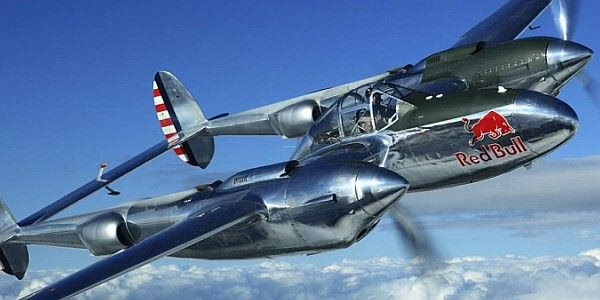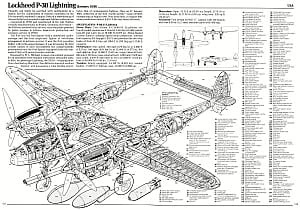Lockheed P-38 Lightning History
The Lockheed P-38 Lightning was the first military type developed by the Lockheed Aircraft Corps. It was designed to meet an Air Corps specification issued in 1936 for a twin-engined interceptor fighter a specification which called for, among many other stringent requirements, a minimum speed of 360 m.p.h. (576 km.h.) at 20,000 ft. (6,100 m.). The design was accepted by the Air corps on June 23, 1937, and the XP-38 prototype was delivered in January 1939. It made its first flight on January 27, 1939, but crashed at the end of a record transcontinental flight California to New York on February 11. The XP-38 was fitted with two 1,040 h.p. Allison V-1710-33 (C15) engines with exhaust-driven G.E. turbo-supercharged and driving Curtiss electric inwardly-rotating airscrews. The armament consisted of one 23 m/m. Madsen cannon and four 50 cal. machine-guns.
A Limited Procurement order for 14 YP-38s followed. Complete Structural re-design lightened this model by 1,300 lbs. It was fitted with two 1,150 h.p. Allison V-1710-27/29 (F2R/F2L) engines driving outwardly-rotating airscrews. (Note: V-1710-27 (F2R) righthand rotation, V-1710-29 (F2L) lefthand rotation, both from rear end). The turbo and cooland installations were improved. The armament compartment was redesigned to house one 37 m/m. cannon, two 50 cal. and two 30 cal. machine-guns. The YP-38 first flew on September 18, 1940, and first delivery to the Air Corps was made in March, 1941.
By late 1943 the Lockheed P-38 Lightning had proven itself in a wide veriety of missions – high-altitude fighter sweeps, bomber escort, medium altitude dogfights, ground attack missions and reconnaissance flights. The harsh condition of North Africa had taken a heavy toll of Lightnings and USAAF pilots, but the aircraft had been established itself as a valuable military tool, and new combat areas were rapidly opening up.
Back in Burbank, Lockheed was paying attention to reports from their field representatives and the USAAF. Hundreds of modifications were incorporated into the Lockheed P-38 Lightning production line, while the design department came up with new variants. Reports from the combat fronts had told of power falling off above 25,000 ft. Automatic oil radiator flaps were fitted to the new P-38H (226 P-38H-1-LO variants constructed) that not only enabled the Allison V-1710-89/91 powerplants, with a take-off rating of of 1425 hp, to run cooler, but let the pilot keep military power on above 25,000 ft, where 1240 hp per engine could be achieved. The P-38H-5-LO (375 built) also had the more powerful B-33 turbosuperchargers installed in the booms.
Major improvements were introduced with the P-38J. One of the key identifying features of the earlier Lightnings was the elegant swept-back ‘shark’ intake behind and below the spinner, which gave the Allison engine installation an extremely streamlined appearance. However, such an arrangement offered inadequate cooling for the engines once performance demands on the Lockheed P-38 Lightning increased.
A P-38E (s/n 41-1983) had been modified at the factory to incorporate larger radiators and much larger scoops under the spinners. This did detract from streamlining but, at the same time, offered an impressive increase in power. With the larger radiator area and new Prestone coolant scoops mounted on the booms, the Allison could operate more efficiently. Testing with the P-38E ad proven the installation more than satisfactory, and the modification was incorporated into the new P-38H production run.
Lockheed P-38 Lightning Specifications
| Aircraft Type: |
| fighter |
| Dimensions: |
| wingspan: 52 ft |
| length: 37 ft, 10 in |
| height: 12 ft |
| Weights: |
| empty: 12,800 lb |
| gross: 17,500 lb |
| Power plant: |
| 2 × 1,475 hp Allison V-1710 liquid-cooled engines |
| Performance: |
| maximum speed: 414 mph |
| ceiling: 40,000 ft |
| maximum range: 1,100 mi |
| Armament: |
| 4 × 0.50 in calibre machine guns |
| 1 × 20 mm calibre cannon |
| 4,000 lb of bombs |
| Operational Use: |
| 1940–1949 |








